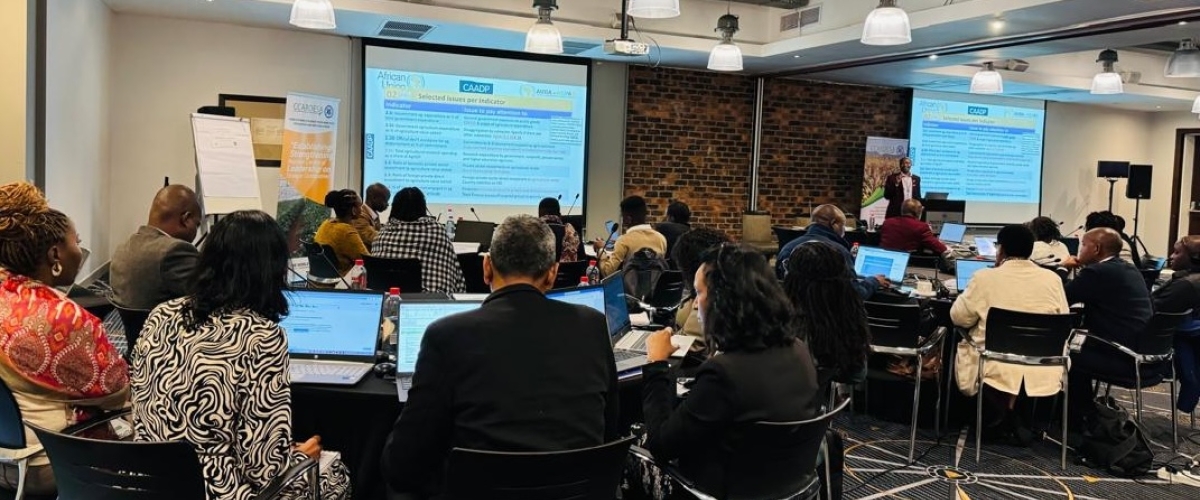
About 48 agricultural policy experts and data specialists from across the Southern African Development Community (SADC) region convened in Johannesburg last week for a Regional Training of Trainers workshop focused on the 5th cycle of the Comprehensive Africa Agriculture Development Programme (CAADP) Biennial Review (BR). The workshop, held from 8 to 10 May 2025 aimed to strengthen Member States' capacity to track and report on agricultural transformation progress in line with the African Union's Malabo Declaration.
The training, which was jointly organized by the SADC Secretariat, the Centre for Coordination of Agricultural Research and Development for Southern Africa (CCARDESA), and the Regional Strategic Analysis and Knowledge Support System for Eastern and Southern Africa (ReSAKSS-ESA), brought together National CAADP Focal Points from 12 SADC countries, representatives of regional institutions, and technical experts. Participants received comprehensive training on updated BR tools, including the Africa Agriculture Transformation Scorecard, the e-BR platform, and a revised set of over 43 performance indicators used to assess progress on the seven Malabo commitments.
 |  |  |  |
Speaking on behalf of the Republic of Zimbabwe, the current SADC Chair, Moses Gamundani commended the region’s efforts while acknowledging areas for improvement:
“The SADC region has been consistently reporting in all the previous Biennial Reviews, although a myriad of challenges have been affecting the reporting process—such as stakeholder mapping, missing data, poor quality of data, and the unavailability of up-to-date statistics. Member States did their best under limited budget allocations towards data collection, and it is commendable to note that performance for some Member States showed positive change—such as Eswatini, Tanzania, Malawi, and Zimbabwe. However, some Member States showed regression in terms of performance. This BR is a chance to recover and showcase that we are doing better at the national level.”
Adding to this, Duncan Samikwa, Senior Programme Officer in SADC’s Directorate of Food, Agriculture and Natural Resources, emphasized the importance of building capacity at the national level:
“This training marks a critical step in ensuring that SADC Member States are better prepared and aligned as we enter the final phase of tracking the Malabo Declaration commitments. Strengthening national capacity for data collection and analysis is not just a technical need—it is essential for evidence-based policy-making and regional accountability. We are encouraged by the level of engagement from all participating countries and look forward to stronger collaboration as we advance towards the 5th Biennial Review submission.”
Representing the host country, Bongeka Mdleleni of South Africa expressed appreciation to organizers and reaffirmed her country’s commitment to continental reporting efforts:
“As we approach the exciting conclusion of the Malabo process, the BR report becomes an essential resource for understanding the positive outcomes of diverse agricultural efforts and interventions throughout the continent. It empowers countries to effectively track, measure, and share the progress we’ve made together in the agreed result areas. We genuinely value the critical support provided by SADC and CCARDESA in the last BR. It is worth highlighting that, as South Africa, we’ve made meaningful progress in addressing these challenges. We must commit to strategies that ensure no Member State is left behind in embracing the continental vision.”
According to the 4th BR Report endorsed by the African Union in 2024, no African country was on track to meet the Malabo targets by 2025. In the SADC region, only a few countries—such as Eswatini, Malawi, Tanzania, and Zimbabwe—scored above 5 out of 10, with several others showing signs of progress. The new training is expected to help countries better align their data systems and policy responses to accelerate agricultural development.
Dr. Majola Mabuza, speaking on behalf of the CCARDESA Executive Director, Prof. Cliff Sibusiso Dlamini, reiterated the organisation’s commitment to supporting the CAADP BR review process at regional level:
“CCARDESA is happy to support this regional effort to enhance technical capacity and promote greater coordination across the region. Accurate, timely, and high-quality data is the bedrock of sound agricultural policy. Through this workshop, we are empowering national teams not only to comply with BR requirements but also to use the insights generated to inform strategic investments that drive real change in the agricultural sector.” He acknowledged the World Bank’s support of the Food Systems Resilience Programme (FSRP) through which the training was supported.
Dr. Greenwell Matchaya, Senior Economist and Deputy Representative at the International Water Management Institute (IWMI) in Pretoria, delivered a keynote presentation highlighting the critical role of the Biennial Review process within the CAADP framework. He emphasized the need to strengthen data systems to support evidence-based decision-making. According to Dr. Matchaya, it is through robust evidence, generated from improved data, that the effective implementation of national “agrifood system transformation plans” can be achieved and the intended outcomes realized.
The training also included sessions on the upcoming communication and advocacy campaign for the 5th BR, designed to build stakeholder awareness and political will around the findings of the report.
The workshop concluded with each country team drafting a national roadmap that aligns with the regional timeline for submitting the 5th BR Report to the African Union Commission later this year.
This regional initiative reaffirms SADC’s commitment to supporting Member States in fulfilling their Malabo obligations and advancing food security, climate resilience, and agricultural transformation in Africa.
 |  |  |





